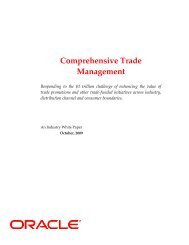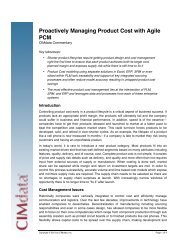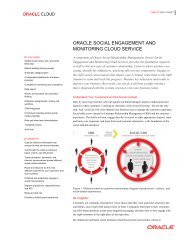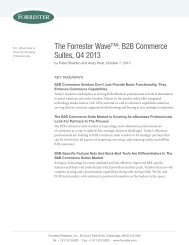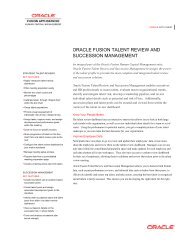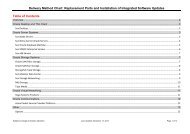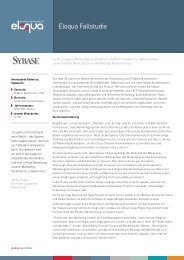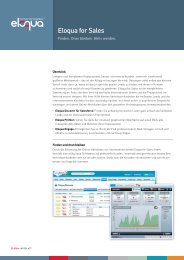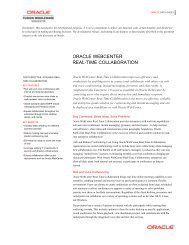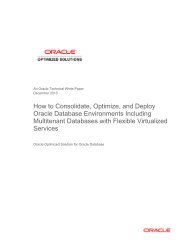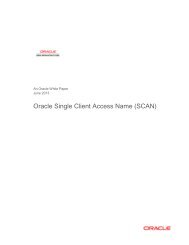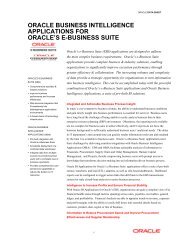Throw Away Half of Your Disks and Run Your Database ... - Oracle
Throw Away Half of Your Disks and Run Your Database ... - Oracle
Throw Away Half of Your Disks and Run Your Database ... - Oracle
You also want an ePaper? Increase the reach of your titles
YUMPU automatically turns print PDFs into web optimized ePapers that Google loves.
<strong>Oracle</strong> Advanced Compression: <strong>Throw</strong> <strong>Away</strong><br />
<strong>Half</strong> <strong>of</strong> <strong>Your</strong> <strong>Disks</strong> <strong>and</strong> <strong>Run</strong> <strong>Your</strong> <strong>Database</strong><br />
Faster<br />
Sushil Kumar, Vineet Marwah
The following is intended to outline our general<br />
product direction. It is intended for information<br />
purposes only, <strong>and</strong> may not be incorporated into any<br />
contract. It is not a commitment to deliver any<br />
material, code, or functionality, <strong>and</strong> should not be<br />
relied upon in making purchasing decisions.<br />
The development, release, <strong>and</strong> timing <strong>of</strong> any<br />
features or functionality described for <strong>Oracle</strong>’s<br />
products remains at the sole discretion <strong>of</strong> <strong>Oracle</strong>.
Agenda<br />
• Data Growth Challenges<br />
• Advanced Compression Feature Overview<br />
• Table Compression<br />
• Unstructured Data Compression<br />
• Backup Compression<br />
• Data Guard Network Transport Compression<br />
• Competitive Analysis<br />
• Questions <strong>and</strong> Answers
Challenges<br />
• Explosion in Data Volumes<br />
• Government Regulations (Sarbanes-Oxley, etc)<br />
• User Generated Content (Web 2.0)<br />
• Application Consolidation<br />
• IT Managers Must Support Larger Volumes <strong>of</strong> Data<br />
with Limited Technology Budgets<br />
• Need to optimize storage consumption<br />
• Also maintain acceptable application performance<br />
• Intelligent <strong>and</strong> Efficient Compression Technology can<br />
Help Address These Challenges
Introducing Advanced Compression Option<br />
• <strong>Oracle</strong> <strong>Database</strong> 11g introduces a comprehensive set<br />
<strong>of</strong> compression capabilities<br />
• Structured/Relational data compression<br />
• Unstructured data compression<br />
• Compression for backup data<br />
• Network transport compression<br />
• Reduces resource requirements <strong>and</strong> costs<br />
• Storage System<br />
• Network B<strong>and</strong>width<br />
• Memory Usage
Table Compression<br />
• Introduced in <strong>Oracle</strong> <strong>Database</strong> 9i Release 2<br />
• Compression during bulk load operations (Direct Load, CTAS)<br />
• Data modified using conventional DML not compressed<br />
• Optimized compression algorithm for relational data<br />
• Improved performance for queries accessing large<br />
amounts <strong>of</strong> data<br />
• Fewer IOs<br />
• Buffer Cache efficiency<br />
• Data is compressed at the database block level<br />
• Compression enabled at either the table or partition level<br />
• Completely transparent to applications
OLTP Table Compression<br />
• <strong>Oracle</strong> <strong>Database</strong> 11g extends table compression for<br />
OLTP data<br />
• Support for conventional DML Operations<br />
(INSERT, UPDATE)<br />
• New algorithm significantly reduces write overhead<br />
• Batched compression ensures no impact for most OLTP<br />
transactions<br />
• No impact on reads<br />
• Reads may actually see improved performance due to fewer<br />
IOs <strong>and</strong> enhanced memory efficiency
OLTP Table Compression Process<br />
Empty<br />
Block<br />
Initially<br />
Uncompressed<br />
Block<br />
Header Data<br />
Free Space<br />
Compressed<br />
Block<br />
Legend<br />
Partially<br />
Compressed<br />
Block<br />
Uncompressed Data<br />
Compressed Data<br />
Compressed<br />
Block
Block-Level Batch Compression<br />
• Patent pending algorithm minimizes performance overhead <strong>and</strong><br />
maximizes compression<br />
• Individual INSERT <strong>and</strong> UPDATEs do not cause recompression<br />
• Compression cost is amortized over several DML operations<br />
• Block-level (Local) compression keeps up with frequent data changes in<br />
OLTP environments<br />
• Competitors use static, fixed size dictionary table thereby compromising<br />
compression benefits<br />
• Extends industry st<strong>and</strong>ard compression algorithm to databases<br />
• Compression utilities such as GZIP <strong>and</strong> BZ2 use similar adaptive, block<br />
level compression
OLTP Table Compression<br />
ID<br />
1<br />
2<br />
3<br />
4<br />
Employee Table<br />
FIRST_NAME<br />
John<br />
Jane<br />
John<br />
Jane<br />
LAST_NAME<br />
Doe<br />
Doe<br />
Smith<br />
Doe<br />
INSERT INTO EMPLOYEE<br />
VALUES (5, ‘Jack’, ‘Smith’);<br />
COMMIT;<br />
Initially Uncompressed<br />
Block<br />
Header<br />
1•John•Doe 2•Jane•<br />
Doe 3•John•Smith 4•<br />
Jane • Doe<br />
Free Space
OLTP Table Compression<br />
ID<br />
1<br />
2<br />
3<br />
4<br />
5<br />
Employee Table<br />
FIRST_NAME<br />
John<br />
Jane<br />
John<br />
Jane<br />
Jack<br />
LAST_NAME<br />
Doe<br />
Doe<br />
Smith<br />
Doe<br />
Smith<br />
Local<br />
Symbol Table<br />
Compressed Block Block<br />
Header<br />
John=|Doe=|Jane=|Smith=<br />
1•John•Doe 2•Jane•<br />
•Doe 5•Jack• 3•John•Smith 4•<br />
Jane • Doe<br />
Free Space<br />
Free Space<br />
1•• 2•• 3•• 4 •
OLTP Table Compression<br />
Uncompressed Block<br />
Header<br />
1•John•Doe 2•Jane•<br />
Doe 3•John•Smith 4•<br />
Jane • Doe 5•Jack<br />
•Smith Free Space<br />
Local<br />
Symbol Table<br />
Compressed Block<br />
Header<br />
John=|Doe=|Jane=|Smith=<br />
1•John•Doe 2•Jane•<br />
•Doe 5•Jack• 3•John•Smith 4•<br />
Jane • Doe<br />
Free Space<br />
Free Space<br />
1•• 2•• 3•• 4 • <br />
More Data<br />
Per Block
Table Compression Syntax<br />
OLTP Table Compression Syntax:<br />
CREATE TABLE emp (<br />
emp_id NUMBER<br />
, first_name VARCHAR2(128)<br />
, last_name VARCHAR2(128)<br />
) COMPRESS FOR ALL OPERATIONS;<br />
Direct Load Compression Syntax (default):<br />
CREATE TABLE emp (<br />
emp_id NUMBER<br />
, first_name VARCHAR2(128)<br />
, last_name VARCHAR2(128)<br />
) COMPRESS [FOR DIRECT_LOAD OPERATIONS];
OLTP Table Compression<br />
Best Practices<br />
• Compress your 10 Largest Tables<br />
• 80/20 Rule – 20% <strong>of</strong> your Tables Consume 80% <strong>of</strong> your Space<br />
• Better Compression with Bigger Block Sizes<br />
• Higher Probability <strong>of</strong> Duplicate Values<br />
• B-Tree Index Compression<br />
• Validate Index <strong>and</strong> Review INDEX_STATS<br />
• INDEX_STATS.OPT_CMPR_COUNT<br />
• INDEX_STATS.OPT_CMPR_PCTSAVE<br />
• Bitmap Indexes are Highly Compressed<br />
• Good for low <strong>and</strong> medium cardinality
OLTP Table Compression<br />
Getting Started with Compression<br />
• Compression Advisor<br />
• Shows projected compression ratio for uncompressed tables<br />
• Reports actual compression ratio for compressed tables
OLTP Table Compression<br />
Getting Started with Compression<br />
• Monitoring Compression<br />
• DBA_TABLES<br />
• COMPRESSION (ENABLED/DISABLED)<br />
• COMPRESS_FOR (ALL OPERATIONS / DIRECT LOAD OPERATIONS)
Table Compression Results<br />
Real World Compression Overview<br />
• Data from <strong>Oracle</strong>’s implementation <strong>of</strong> <strong>Oracle</strong> Applications<br />
• Compressed the 10 Largest Tables<br />
• Two copies <strong>of</strong> each table: Compressed <strong>and</strong> Uncompressed<br />
• <strong>Oracle</strong> Enterprise Linux<br />
• <strong>Oracle</strong> <strong>Database</strong> 11g Release 1<br />
• Test Queries<br />
• Full Table Scan<br />
• Index Range Scan<br />
• DML Operations (Insert, Update, Delete)
Real World Compression Results<br />
MB<br />
2500<br />
2000<br />
1500<br />
1000<br />
500<br />
0<br />
Storage Utilization<br />
No Compression Compression<br />
More than 70%<br />
Storage Savings
Real World Compression Results<br />
Time<br />
(seconds)<br />
0.4<br />
0.3<br />
0.2<br />
0.1<br />
0<br />
Table Scan Performance<br />
No Compression Compression<br />
Compression is<br />
2.5x Faster
Real World Compression Results<br />
Physical<br />
Reads<br />
14000<br />
12000<br />
10000<br />
8000<br />
6000<br />
4000<br />
2000<br />
0<br />
Table Scan Reads<br />
No Compression Compression<br />
Compression<br />
performs<br />
3.5x fewer reads
Real World Compression Results<br />
Time<br />
(seconds)<br />
0.03<br />
0.02<br />
0.01<br />
0<br />
Index Range Scan Performance<br />
No Compression Compression<br />
No Performance<br />
Impact on<br />
Index Scans
Real World Compression Results<br />
Time<br />
(seconds)<br />
35<br />
30<br />
25<br />
20<br />
15<br />
10<br />
5<br />
0<br />
DML Performance<br />
No Compression Compression<br />
Compression<br />
has less than 3%<br />
overhead
Introduction to SecureFiles<br />
• SecureFiles is a new 11g feature designed to break the<br />
performance barrier keeping file data out <strong>of</strong> databases<br />
• Next-generation LOB<br />
• Superset <strong>of</strong> LOB interfaces allows easy migration from LOBs<br />
• Transparent deduplication, compression, <strong>and</strong> encryption<br />
• Leverage the security, reliability, <strong>and</strong> scalability <strong>of</strong> database<br />
• Enables consolidation <strong>of</strong> file data with associated relational data<br />
• Single security model<br />
• Single view <strong>of</strong> data<br />
• Single management <strong>of</strong> data<br />
• Scalable to any level using SMP scale-up or grid scale-out
SecureFiles Deduplication<br />
Secure Hash<br />
• Enables storage <strong>of</strong> a single physical image for duplicate data<br />
• Significantly reduces space consumption<br />
• Dramatically improves writes <strong>and</strong> copy operations<br />
• No adverse impact on read operations<br />
• May actually improve read performance for cache data<br />
• Duplicate detection happens within a table, partition or sub-partition<br />
• Specially useful for content management, email applications <strong>and</strong><br />
data archival applications
SecureFiles Compression<br />
• Huge storage savings<br />
• Industry st<strong>and</strong>ard compression algorithms<br />
• 2-3x compression for typical files (combination <strong>of</strong> doc, pdf, xml)<br />
• Allows for r<strong>and</strong>om reads <strong>and</strong> writes to Compressed SecureFile data<br />
• Can be specified at a partition level<br />
• Automatically detects if SecureFile data is compressible<br />
• Skips compression for already compressed data<br />
• Auto-turn <strong>of</strong>f compression when space savings are minimal or zero<br />
• Two levels <strong>of</strong> compression provide different compression ratios<br />
• SecureFiles Compression is independent <strong>of</strong> table or index<br />
compression
SecureFiles Compression Syntax<br />
Compression Syntax<br />
CREATE TABLE docs (<br />
doc_id NUMBER,<br />
doc BLOB)<br />
LOB(image) STORE AS SECUREFILE<br />
(TABLESPACE lob_tbs COMPRESS);<br />
Deduplication Syntax<br />
CREATE TABLE images (<br />
image_id NUMBER,<br />
image BLOB)<br />
LOB(image) STORE AS SECUREFILE<br />
(TABLESPACE lob_tbs DEDUPLICATE);
Data Pump Compression<br />
• Metadata compression available since <strong>Oracle</strong> <strong>Database</strong> 10g<br />
• <strong>Oracle</strong> <strong>Database</strong> 11g extends compression to table data during<br />
exports<br />
• No need to decompress before import<br />
• Single step compression <strong>of</strong> both data <strong>and</strong> metadata<br />
• Compressed data directly hits disk resulting in reduced disk space<br />
requirements<br />
• Internal tests reduced dump file size up to 75%<br />
• Compression factor comparable to GNU gzip utility<br />
• Application transparent<br />
• Complete Data Pump functionality available on compressed files
Data Pump Compression<br />
• Performance cost: ~10% overhead<br />
• Compression Ratio: comparable to gzip<br />
Compression Method OE/SH<br />
Schemas<br />
Spatial Table Spatial<br />
Schema<br />
exdp compression=none 6.0 MB 26.6 MB 443 MB<br />
expdp compression=all 1.5 MB (74.7%) 9.9 MB (62.7%) 140 MB (68.4%)<br />
gzip –cv1 1.1 MB (82.7%) 11.4 MB (57.1%) 162 MB (63.4%)<br />
gzip –cv6 835 KB (86.2%) 10.2 MB (61.7%) 142 MB (68.0%)<br />
gzip –cv9 818 KB (86.5%) 10.1 MB (62.0%) 141 MB (68.2%)<br />
compress 1.6 MB (74.2%) 13.8 MB (48.1%) 198 MB (55.3%)
Backup Compression<br />
• Fast RMAN Compression<br />
• Compresses the backup set contents before writing them to disk or<br />
tape<br />
• No extra decompression steps are required during recovery when<br />
you use RMAN compression<br />
• High performance, industry st<strong>and</strong>ard compression algorithm<br />
• 40% faster backup compression versus <strong>Oracle</strong> <strong>Database</strong> 10g<br />
• Suitable for fast, incremental daily backups<br />
• Reduces network usage
Backup Compression Syntax<br />
FAST RMAN Compression Configuration<br />
RMAN> CONFIGURE COMPRESSION ALGORITHM ‘zlib’;<br />
RMAN Compression Syntax<br />
RMAN> backup as COMPRESSED BACKUPSET database<br />
archivelog all<br />
DataPump Syntax<br />
PROMPT> expdp hr FULL=y<br />
DUMPFILE=dpump_dir:full.dmp COMPRESS
RMAN Compression Results<br />
RMAN Compression Overview<br />
• Data from <strong>Oracle</strong>’s implementation <strong>of</strong> <strong>Oracle</strong> Applications<br />
• 3.5 GB <strong>Database</strong><br />
• <strong>Oracle</strong> Enterprise Linux<br />
• <strong>Oracle</strong> <strong>Database</strong> 11g Release 1<br />
• Test 1: Slow I/O (16 MB/s)<br />
• 11g RMAN without Compression<br />
• 10g RMAN with Compression<br />
• 11g RMAN with FAST Compression<br />
• Test 2: Fast I/O (200 MB/s)<br />
• 11g RMAN without Compression<br />
• 10g RMAN with Compression<br />
• 11g RMAN with FAST Compression
GB<br />
Backup Compression Results<br />
3500<br />
3000<br />
2500<br />
2000<br />
1500<br />
1000<br />
500<br />
0<br />
Backup Size Comparison<br />
Compression<br />
reduced backup<br />
size by 6x<br />
No Compression 10g Compression 11g Compression
Time (Seconds)<br />
Backup Compression<br />
250<br />
200<br />
150<br />
100<br />
50<br />
0<br />
Backup Speed Comparison<br />
Slow I/O (Tape)<br />
No Compression 10g Compression 11g Compression<br />
11g Compression<br />
reduces backup<br />
time by almost 3x
Time (Seconds)<br />
Backup Compression<br />
250<br />
200<br />
150<br />
100<br />
50<br />
0<br />
Backup Speed Comparison<br />
Slow I/O (Tape)<br />
No Compression 10g Compression 11g Compression<br />
11g Compression<br />
is almost 2.5x<br />
faster than 10g<br />
Compression
Time (Seconds)<br />
Backup Compression<br />
250<br />
200<br />
150<br />
100<br />
50<br />
0<br />
Backup Speed Comparison<br />
Fast I/O (Disk)<br />
No Compression 10g Compression 11g Compression<br />
11g Compression<br />
is almost 2.5x<br />
faster than 10g<br />
Compression
<strong>Oracle</strong> Data Guard<br />
Primary<br />
<strong>Database</strong><br />
Data Guard<br />
Redo Shipping<br />
St<strong>and</strong>by<br />
<strong>Database</strong><br />
• Redo Shipping<br />
• Send redo data over network from primary to st<strong>and</strong>by<br />
• Size <strong>of</strong> redo data typically small (transactional) <strong>and</strong> not network-bound<br />
• Gap Resolution<br />
• After network outage – resynchronize st<strong>and</strong>by<br />
• Size <strong>of</strong> redo data much larger
Network Compression<br />
<strong>Oracle</strong> Data Guard Redo Transport Services<br />
• Fast re-sync <strong>of</strong> st<strong>and</strong>by database after network outages<br />
• Lower b<strong>and</strong>width networks (100 Mbps)<br />
• Compression will not reduce transmission time<br />
• But will reduce b<strong>and</strong>width consumption up to 35%
Competitive Analysis<br />
Competitive Analysis – DB2<br />
<strong>Oracle</strong><br />
Block level compression<br />
- Adaptive / dynamic compression<br />
- Unlimited compression values<br />
Zero decompression overhead<br />
- Minimal compression overhead<br />
- Batched compression<br />
Index compression<br />
Unstructured data compression<br />
<strong>and</strong> de-duplication (SecureFiles)<br />
Table/partition level compression<br />
dictionary<br />
- New data may not be<br />
compressed / <strong>of</strong>fline rebuild<br />
symbol table<br />
- Max 4K values per table<br />
Some decompression overhead<br />
- More compression overhead<br />
- Transactional compression<br />
None<br />
None<br />
IBM DB2
Competitive Analysis – DB2<br />
• Even without compression, <strong>Oracle</strong> needs less disk space<br />
than DB2:<br />
• <strong>Oracle</strong> uses variable length representation for numbers – DB2<br />
uses fixed length<br />
• DB2 has more overhead for VARCHAR data<br />
• SAP BW data needs 30-50% less disk space if stored in<br />
<strong>Oracle</strong>
Competitive Analysis – Teradata<br />
<strong>Oracle</strong><br />
Block level compression<br />
- Dynamic compression values<br />
- Unlimited values<br />
All data types supported<br />
- Minimal compression overhead<br />
- Batched compression<br />
Backup compression<br />
Unstructured data compression<br />
<strong>and</strong> de-duplication (SecureFiles)<br />
Field level compression<br />
- Admin must define compression<br />
values<br />
- Max 255 compression values<br />
Limited data type support<br />
- More compression overhead<br />
- Transactional compression<br />
None<br />
None<br />
Teradata
Competitive Analysis –<br />
Hardware Based Compression<br />
<strong>Oracle</strong><br />
<strong>Database</strong> specific compression<br />
algorithm<br />
Fine grained compression –<br />
compress at tablespace, table or<br />
partition level<br />
Improved read performance in<br />
several cases – no<br />
decompression overhead<br />
Improved memory efficiency -<br />
data stays compressed in<br />
memory<br />
Batched algorithm for minimal<br />
compression overhead<br />
Benefits automatically cascade to<br />
all environments<br />
Hardware Compression<br />
Generic compression algorithm -<br />
deficient for databases<br />
No fine grained compression -<br />
compress at file level<br />
Poor read performance –<br />
significant decompression<br />
overhead<br />
No memory benefits - data needs<br />
to be decompressed<br />
Data updates are very expensive<br />
Benefits limited to specific<br />
hardware environment
Competitive Analysis<br />
Size, MB<br />
6000<br />
5000<br />
4000<br />
3000<br />
2000<br />
1000<br />
0<br />
Compression: <strong>Oracle</strong> vs Competition<br />
Top 10 Tables in an ERP Application<br />
<strong>Oracle</strong> No<br />
Compress<br />
Competition No<br />
Compress<br />
<strong>Oracle</strong><br />
Compress<br />
Competition<br />
Compress
Summary<br />
• Advanced Compression Option contains<br />
comprehensive data compression capabilities for all<br />
types <strong>of</strong> data<br />
• Structured, Unstructured, Backup, Network Transport<br />
• Reduces storage consumption by 2 to 4 times<br />
• Improves read performance<br />
• Enhances memory, buffer cache utilization<br />
• Complete application transparency<br />
• Benefits diverse application workloads



